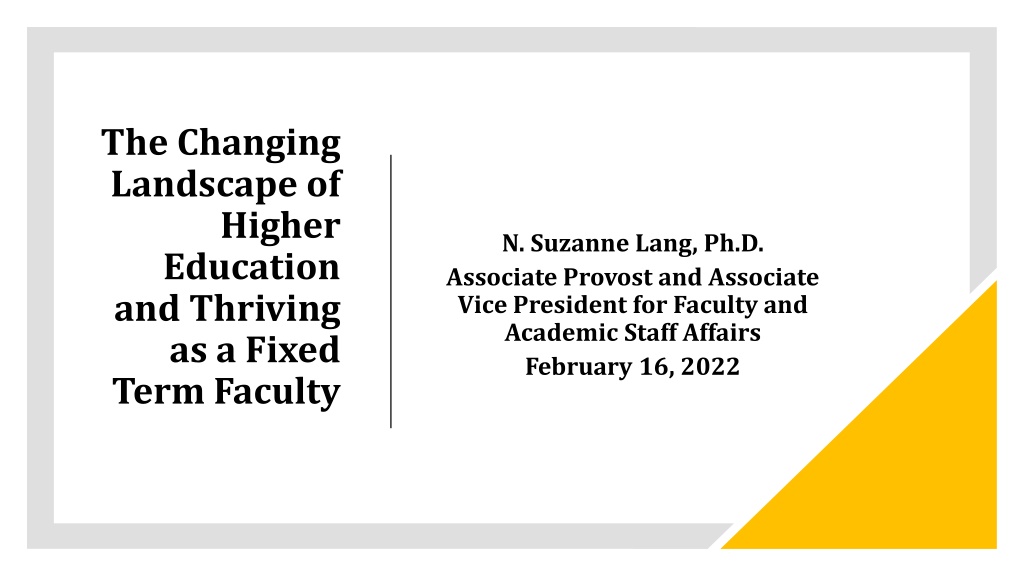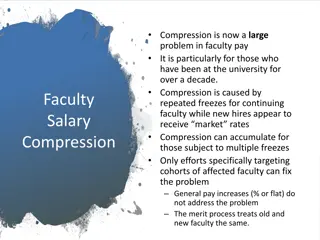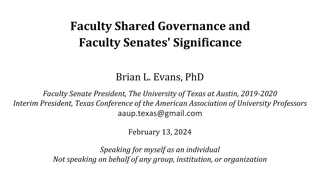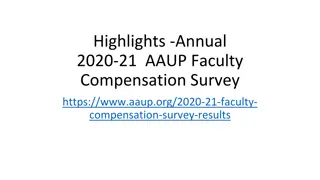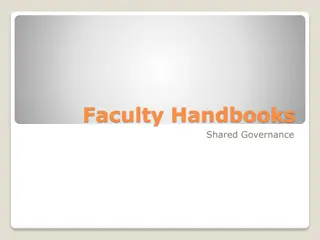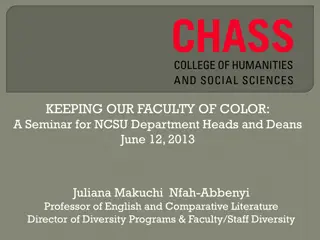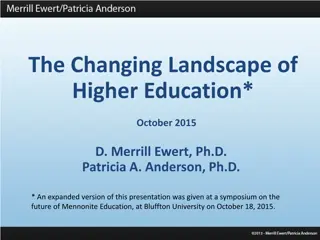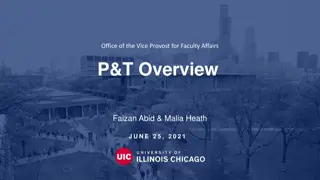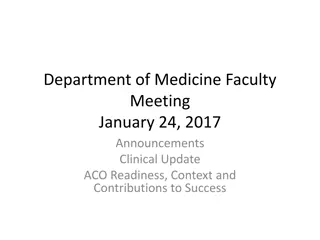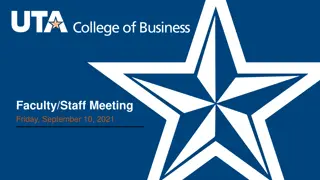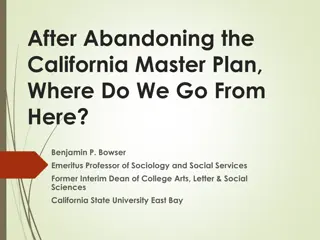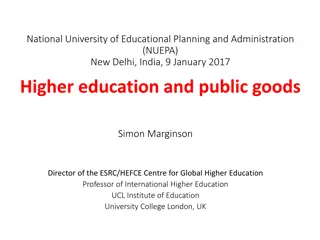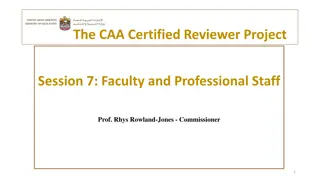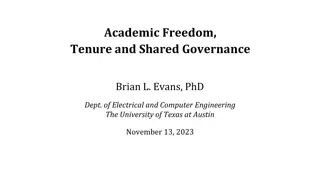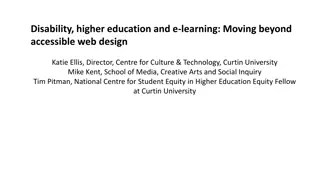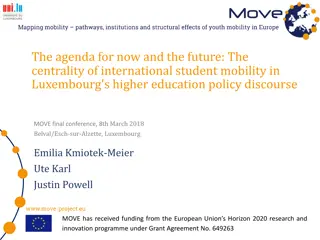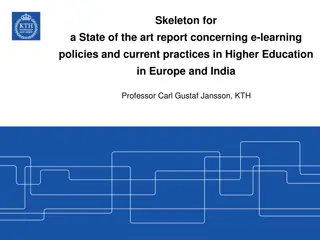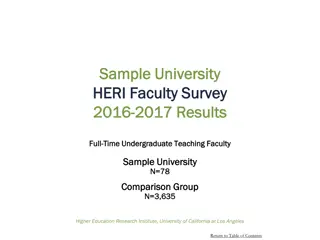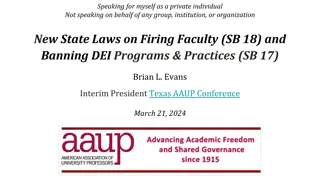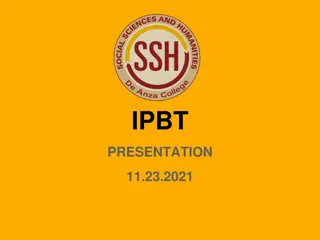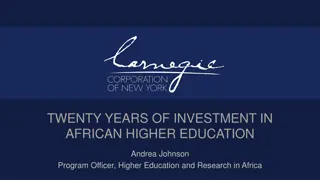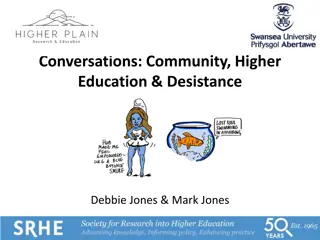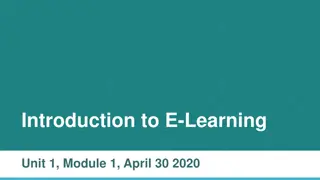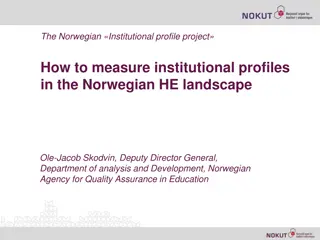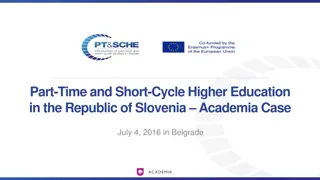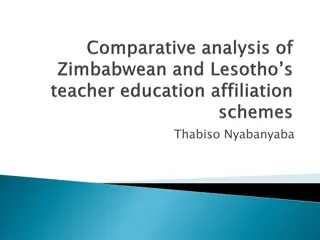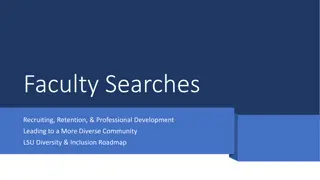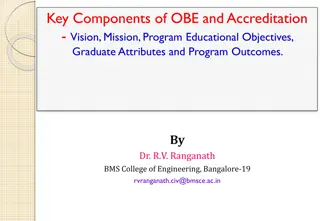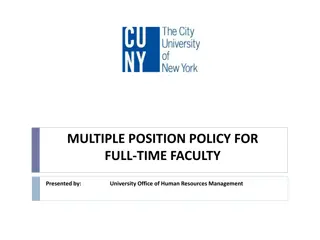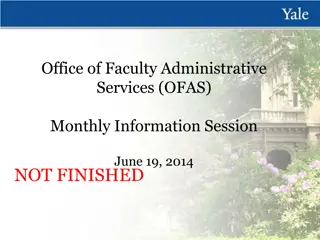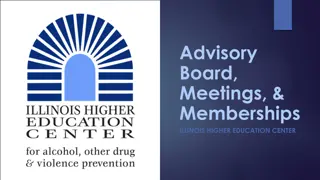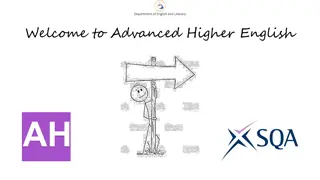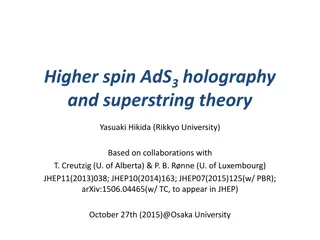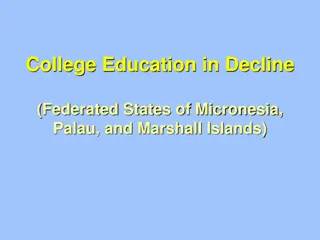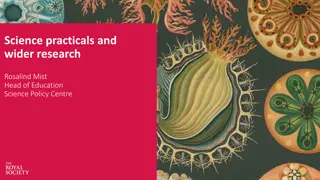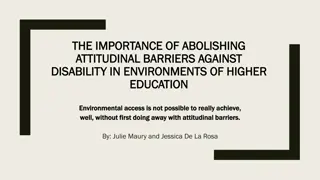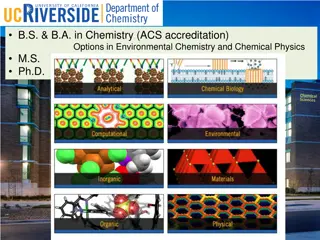The Changing Landscape of Higher Education and Faculty Trends
The content discusses the evolving landscape of higher education, trends in fixed-term faculty appointments, demographics, and implications of the shift in appointment patterns. It addresses factors such as increasing enrollments, economic pressures, market fluctuations, and technological changes influencing these trends.
Download Presentation

Please find below an Image/Link to download the presentation.
The content on the website is provided AS IS for your information and personal use only. It may not be sold, licensed, or shared on other websites without obtaining consent from the author. Download presentation by click this link. If you encounter any issues during the download, it is possible that the publisher has removed the file from their server.
E N D
Presentation Transcript
The Changing Landscape of Higher Education and Thriving as a Fixed Term Faculty N. Suzanne Lang, Ph.D. Associate Provost and Associate Vice President for Faculty and Academic Staff Affairs February 16, 2022
Changing Landscape of Higher Education and Trends at MSU The Annual Review Process and Principles Overview of the Promotion Process Agenda
Tenure System/Fixed Term Faculty 2011-2021 2500 Fixed Term Faculty at MSU 2000 NUMBER OF FACULTY Range of appointment types: foci on teaching, research, and/or service and outreach 1500 1000 500 0 2011 1965 2012 1945 2013 1934 2014 1955 2015 1945 2016 1988 2017 2009 2018 1995 2019 1977 2020 1996 2021 1936 Tenure System Total Fixed Term Total 1082 1168 1185 Tenure System Total 1212 1261 1306 1337 1333 1300 1342 1381 Fixed Term Total
Fixed Term Faculty Appointment Categories Fixed Term Faculty Appointment Categories 883 Faculty 744 16 FRIB/NSCL Faculty 28 Research Faculty 207 HP Faculty 140 0 100 200 300 400 500 600 700 800 900 1000 2021 2011
FT Faculty by Gender 2001/2011/2021 800 716 700 665 600 545 537 500 Demographics 398 385 400 300 200 100 0 2001 2011 Women 2021 Men
Fixed Term Faculty by Race FT Faculty by Race 2001/2011/2021 1200 2001 2011 2021 1000 800 600 400 200 0 American Indian/Alaskan Native Hawaian/Pacific Islander Black Asian Hispanic 2 or more races White 2001 37 56 23 0 4 0 663 2011 60 132 34 0 0 4 852 2021 81 154 59 1 5 10 1071
Increasing enrollments Economic pressures Market fluctuations and need to respond to employer and student interests Technological changes and new teaching processes Public skepticism about tenure Why this Shift in Appointment Patterns in the National Landscape?
Some Implications Institutional excellence requires tapping into the full range of talent across our faculty and academic staff Separating elements of faculty work ( Unbundling ) Some individuals focus on particular components, such as teaching Provides flexibility for institution as needs evolve Increased emphasis on productivity and accountability
Faculty Members are Essential Faculty at colleges and universities are the heart of the institutions where they work and the intellectual capital that ensures the excellence of these institutions. Quality of the faculty contributes directly to the effectiveness of universities and colleges in fulfilling their missions. Attracting, retaining, and supporting a diverse group of academics, across all appointment types, relates directly to institutional excellence.
Fixed Term Faculty are Highly Valued at MSU MSU cares about your professional growth, your job satisfaction, and the quality and success of your work at the university. This workshop offers ideas for how you can thrive as you advance your careers at MSU.
Ensure that each individual has a clear understanding of what is expected of them in their appointment Purpose of the Annual Review Process for Fixed Term Faculty Assess individual performance against expectations Provide an opportunity to provide input to unit administrators about their performance Provide a basis for making decisions on merit pay Provide input for decisions about future appointments
Principles That Should be Incorporated in Unit Bylaws Each fixed term faculty member shall be evaluated on an annual basis and informed in writing of the results of their evaluation by the unit administrator Each unit shall have clearly formulated and relevant written performance criteria and shall provide these at the time of appointment, and subsequently as necessary, to clarify expectations
Fixed term faculty shall be informed of all factors used for evaluation, the evaluation of their performance on each of these factors and the relationship between their performance and decisions on merit salary adjustments and, if appropriate, on reappointment and promotion All assigned duties should be given weight in the evaluation The annual assessment shall be reflected in recommendations to the Provost's Office regarding additional appointments, reappointment, and/or promotion Principles That Should be Incorporated in Unit Bylaws
Evaluation & Impact of COVID COVID Impact statement - The purpose is to acknowledge that faculty and academic staff (fas) at MSU have encountered varied challenges due to the pandemic. Guidelines for FAS on writing a COVID-19 impact statement that may be submitted to their unit administrator as part of their activity report for annual review, and to internal and external reviewers upon promotion appointment assessments. Prompts for considering what to include in the impact statement.
How to Use a COVID Impact Statement (1 of 3) Broad discussions within disciplines and academic units need to be facilitated to explore how the discipline(s) has been impacted by the pandemic and what opportunities for program growth and scholarship were not possible to inform the context of how to judge accomplishments. The impact statement provided by a FAS member is accepted as valid because they are a trusted member of the scholarly community. Each impact statement is equally valued.
How to Use a COVID Impact Statement (2 of 3) Impact of the pandemic may be accelerating as well as decelerating and may change over time. Under such extraordinary times, the work that is produced can still be evaluated based on quality and relevance to increasing knowledge and understanding rather than on quantity of work. Assessments about annual reviews, reappointment, and promotion must be made on the information provided by the FAS member. While a COVID impact statement is not required, impact that is not documented cannot be considered in assessments.
How to Use a COVID Impact Statement (3 of 3) Value-based categories like sharing information, expanding opportunities of others, and mentoring/stewardship may be applied to activity reports and impact statements to allow FAS to share the multiple ways learning, teaching, and knowing have occurred to indicate how FAS have been doing valuable, adaptive, human-based work in other new and perhaps non-traditional ways.
The recognition that comes from being promoted through the academic ranks should be available to all whose performance warrants it. A fixed term faculty member's level of accomplishment, even if limited to a narrow range of duties (e.g. only teaching), should reflect the same level of accomplishment for that set of duties as is required for a tenure system faculty member being promoted to the same rank. Promotion of Fixed Term Faculty : Guiding Principles
Department level committee makes recommendation to chair or school director Chair independently makes a recommendation to the dean The Promotion Review Process The dean is advised by a college review committee The dean independently makes a recommendation to the provost
Provost makes promotion decision In Human Health Colleges (CHM, COM, CON), Provost and EVP will make joint decision The Promotion Review Process (continued)
Please feel free to reach out to the Office for Faculty and Academic Staff Affairs team. N. Suzanne Lang, Ph.D., langsu@msu.edu langsu@msu.edu Questions? Kathy Lewless, MHRLR, lewlessk@msu.edu lewlessk@msu.edu We are here to support you. Melissa Sortman, MA, sortmanm@msu.edu sortmanm@msu.edu Jennie Yelvington, MSW, petrovi8@msu.edu petrovi8@msu.edu Kara Yermak, MHRLR, burtkara@msu.edu burtkara@msu.edu
